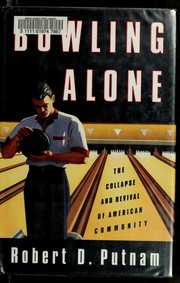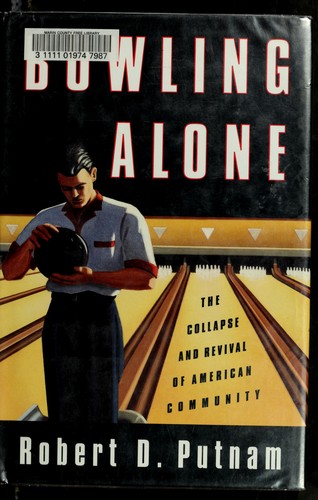Check nearby libraries
Buy this book

"Putnam's work shows how social bonds are the most powerful predictor of life satisfaction. For example, he reports that getting married is the equivalent of quadrupling your income and attending a club meeting regularly is the equivalent of doubling your income. The loss of social capital is felt in critical ways: Communities with less social capital have lower educational performance and more teen pregnancy, child suicide, low birth weight, and prenatal mortality.
Social capital is also a strong predictor of crime rates and other measures of neighborhood quality of life, as it is of our health: In quantitative terms, if you both smoke and belong to no groups, it's a close call as to which is the riskier behavior."--BOOK JACKET.
Check nearby libraries
Buy this book

Previews available in: English
Subjects
Social conditions, Social change, History, Isolation <Soziologie>, Conditions sociales, Histoire, Changement social, Mudança social (história;século 20), Sozialer Wandel, Participation sociale, Estrutura social (século 20), Community life, Social isolation, Isolation, Social values, United states, social conditions, 1945-, New York Times reviewed, SociologyPlaces
United StatesTimes
1945-, 20th century| Edition | Availability |
|---|---|
|
1
Bowling Alone : Revised and Updated: The Collapse and Revival of American Community
2020, Simon & Schuster, Incorporated
in English
1982130849 9781982130848
|
zzzz
|
|
2
Bowling Alone: Revised and Updated: The Collapse and Revival of American Community
December 13, 2016, Simon & Schuster Audio
Audiobook
1508230595 9781508230595
|
zzzz
|
|
3
Bowling Alone: The Collapse and Revival of American Community
August 7, 2001, Simon & Schuster
Paperback
in English
- New Ed edition
0743203046 9780743203043
|
eeee
|
|
4
Bowling Alone : Revised and Updated: The Collapse and Revival of American Community
2001, Simon & Schuster
in English
0743219031 9780743219037
|
zzzz
|
|
5
Bowling alone: the collapse and revival of American community
2000, Simon & Schuster
in English
0684832836 9780684832838
|
aaaa
|
|
6
Bowling Alone: The Collapse and Revival of American Community
June 1, 2000, Simon & Schuster
Hardcover
in English
0684832836 9780684832838
|
zzzz
|
Book Details
Edition Notes
Includes bibliographical references (p. [445]-504) and index.
Classifications
The Physical Object
Edition Identifiers
Work Identifiers
Source records
Collingswood Public Library recordIthaca College Library MARC record
Internet Archive item record
Internet Archive item record
marc_openlibraries_phillipsacademy MARC record
marc_openlibraries_sanfranciscopubliclibrary MARC record
Marygrove College MARC record
Library of Congress MARC record
marc_scms MARC record
ISBNdb
Better World Books record
marc_columbia MARC record
Work Description
"Updated to include a new chapter about the influence of social media and the Internet—the 20th anniversary edition of Bowling Alone remains a seminal work of social analysis, and its examination of what happened to our sense of community remains more relevant than ever in today’s fractured America. Twenty years, ago, Robert Putnam made a seemingly simple observation: once we bowled in leagues, usually after work; but no longer. This seemingly small phenomenon symbolized a significant social change that became the basis of the acclaimed bestseller, Bowling Alone, which The Washington Post called “a very important book” and Putnam, “the de Tocqueville of our generation.” Bowling Alone surveyed in detail Americans’ changing behavior over the decades, showing how we had become increasingly disconnected from family, friends, neighbors, and social structures, whether it’s with the PTA, church, clubs, political parties, or bowling leagues. In the revised edition of his classic work, Putnam shows how our shrinking access to the “social capital” that is the reward of communal activity and community sharing still poses a serious threat to our civic and personal health, and how these consequences have a new resonance for our divided country today. He includes critical new material on the pervasive influence of social media and the internet, which has introduced previously unthinkable opportunities for social connection—as well as unprecedented levels of alienation and isolation. At the time of its publication, Putnam’s then-groundbreaking work showed how social bonds are the most powerful predictor of life satisfaction, and how the loss of social capital is felt in critical ways, acting as a strong predictor of crime rates and other measures of neighborhood quality of life, and affecting our health in other ways. While the ways in which we connect, or become disconnected, have changed over the decades, his central argument remains as powerful and urgent as ever: mending our frayed social capital is key to preserving the very fabric of our society"--Simon & Schuster.
Links outside Open Library
Community Reviews (0)
| March 31, 2024 | Edited by | Merge works |
| August 6, 2021 | Edited by New York Times Bestsellers Bot | Add NYT review links |
| July 31, 2020 | Edited by ImportBot | import existing book |
| March 2, 2020 | Edited by MARC Bot | remove fake subjects |
| December 10, 2009 | Created by WorkBot | add works page |


















